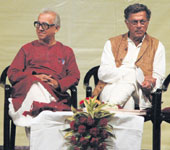 |
| Pabitra Sarkar and Girish Karnad at Sisir Mancha. Picture by Sanat Kumar Sinha |
Natya Sodh Sansthan is 25, and in all this time there hasn?t grown ?another similar organisation of this stature anywhere in India?, according to playwright, actor and director Girish Karnard.
?Natya Sodh was possible because of personal relations. I came because I felt close to Calcutta and Badal Sircar. I was impressed by Pratibha Agarwal?s zeal for the spread and preservation of theatre, so we supported her, contributed to the archive... Nowadays, everyone is too busy,? explained theatre veteran Satyadev Dubey, a founder member of Natya Sodh. Dubey, whose latest work is Thamb Lakshmi Kumkum Lade (Stop Lakshmi Let Me Put Sindoor on You) in Marathi, has ?brought along an old video recording of Tuglaq? for the archive.
Badal Sircar was unable to make it due to ill health, but joining Girish Karnad on the dais were Pabitra Sarkar, Shyamanand Jalan and Bishwambhar Dayal Sureka. The audience was sprinkled with theatre personalities like Ratan Thiyam (Manipur), Satish Alekar (Pune), Rajinder Nath (New Delhi), Satyadev Dubey (Mumbai), Anant Mahapatra (Bhubaneswar), Bhanu Bharati (Udaipur), Amal Allana (New Delhi) and Devendra Raj Ankur (director, NSD, New Delhi).
With Bikhre Bimba (Broken Images), a one-woman play with Arundhati Nag in the lead, now behind him, Girish Karnard is busy writing a new play. ?It focuses on a wedding in the family and the animosities past and present it brings out from hiding.?
But Karnad?s inaugural speech was on the decline in playwriting and the ?death of theatre?. Tracing the huge gap in playwriting history from the Sanskrit plays of 8th century to the 19th century and the obsession with Shakespeare, he concluded that the scene in Maharashtra was still promising, but theatre was losing out in Karnataka to cable TV and in Calcutta there were ?too many mournful faces.?
Capturing the nostalgia in print were several publications like a theatre encyclopaedia Bharatiya Ranga Kosh Sandarbha ? Hindi Part II, published by Natya Sodh and NSD, Rang Vyaktitva edited by Pratibha Agarwal, and Preserving Memories, a volume of archival excerpts. Also screened were some rare recordings from the Natya Sodh collection compiled by Bimal Lath.
Natadha, Howrah?s premier group, celebrated its 32nd anniversary with a festival showcasing its latest production, Julius Caesar. For the second consecutive time, director Shib Mukhopadhyay has selected a classic political drama. But unlike his previous success with Tagore?s Raktakarabi, Julius Caesar comes as a staid, rather bookish exercise.
Mukhopadhyay?s programme note indicates his aim to concentrate on character and dialogue, and reluctance to upset stage convention. Unfortunately, this approach just cannot jell with a text that preaches rebellion against authoritarianism.
Thus, while we sympathise with a decidedly senior, portly Brutus (Samir Chattopadhyay) and an extremely lean and hungry Cassius (Subrata Chattopadhyay), the real target of Natadha?s attack remains vague, even though Mukhopadhyay alludes to intra-class disagreements on state power in elected democracies. Caesar (Prashanta Bandyopadhyay) does not seem that bad a person or ruler, whereas the callow Antony (Arindam Mukhopadhyay) turns into quite a scorpion against the opposition.
Typically for Bengali versions of Shakespeare, the wives become dispensable baggage and the soldiers? spindly legs belie the fact that the Roman army conquered half of Europe as well as contiguous Asia and Africa. The lack of sufficient interest given to the play is topped by a reference to its ?nearly 500-year? age: Natadha should know that Julius Caesar has just about crossed 400 years.
Adapting books for the stage is always a risky business, with the stakes high for both success and disaster. Working with children in theatre is an equally brave venture, with the risk of self-combustion so much higher. New theatre company The Hobbits ran this gauntlet at Gyan Manch on July 13, and in the process produced a commendable adaptation of Roald Dahl?s children?s classic Matilda.
Adapted by co-director Abhik Bhattacherji, the play tells the story of an exceptionally gifted young girl called Matilda who is born into an unappreciative family. Matilda seeks solace in books and her teacher Miss Honey, who is dominated by her aunt the feared Miss Trunchbull, headmistress of Matilda?s school
The character of Matilda was played initially by four-year-old Shristi Arora, who then handed the baton to Shreya Bhattacharya to play an older Matilda for the majority of the show. Shreya handled the part with ease.
Competent performances were also put in by Arpita Elias as Miss Honey, and Srilata Sircar, as Miss Phelps and Mrs Wormwood. The most dynamic actors were Priyanka Sinha as Miss Trunchbull and Shubhanker Bhattacharya as Mr Wormwood.
Being the first production by the company, there were naturally some teething problems, including clumsy transitions. Also, the adaptation from the book was at places rather stilted, with a sense of anticipation for the play?s climax lacking.
Co-director Kevin Shah was optimistic about future productions by The Hobbits: ?We plan to produce an adaptation of another Roald Dahl classic, Charlie and the Chocolate Factory.? Co-director and adapter Abhik Bhattacherji summed up The Hobbits by comparing them to Tolkien?s characters: ?Although they were extremely little they still possessed immense creativity!?










